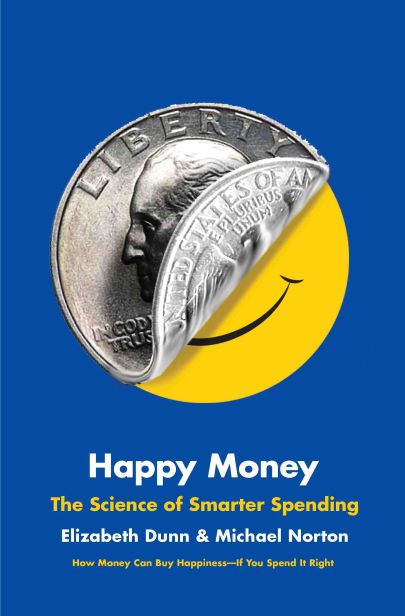The book, Happy Money: The Science of Smarter Spending by Elizabeth Dunn and Michael Norton is right up my alley. I am all about living a happier life yet money is often blamed and viewed as an obstacle of happiness. I love to learn about and help other people to live a life of meaning, purpose and joy. I truly believe that money is, or should be a tool to HELP us live the life that we want AND to help others.
Many people believe that more money will lead to more happiness for them.
This is NOT true. I have seen it with clients and the science backs this up.
The book, Happy Money focuses on sharing the data and science that shows HOW you spend your money can lead to MORE happiness.
The five main lessons from the Happy Money book are:
In my previous articles, I went into detail on each of these five principles. Today I want to summarize and share my own conclusions from the book.
1. Many of the ways to increase happiness with money overlap and can easily be combined.
I am all about efficiency so I love thinking about how you can do many of these happiness boosting things all at once and also how many of them overlap. Does that create more happiness bang for your buck? I’m not sure and they did not directly study that, but I still think it is fun to think about. For example, if you spend money on someone else with a fun experience that is a special treat, chances are it will increase your happiness.
This book reinforced the idea that more is not better with things or experiences which is why keeping certain things a “treat” increases your enjoyment of them. It is human nature to start taking for granted things that you do often and regularly. Common occurrences become the new normal and therefore lose their “specialness.”
It makes so much sense to me that experiences provide more happiness than things because you get to look forward to it in the future, you get to enjoy it in the moment AND you get to remember and treasure the memories and stories too. One experience can be enjoyed in many different ways. Most things can be replaced. Those things that are most valuable to us are usually precious for sentimental reasons and the meaning or emotions they evoke.
2. Small actions can make a big difference in your happiness
I love the fact that the happiness boost you get from giving to others does not correlate to the dollar amount. A thoughtful small gift or action for someone may not even cost anything yet it can still provide a happiness boost for you and for them.
I like to remember that giving to others also helps your health and helps you to feel wealthier.
The concept is the same with respect to time. We FEEL like we have more time (even when we don’t) when we take the time to help others. It decreases our stress and we have the benefit of the double happiness boost for the satisfaction of helping someone else and the feeling of more time affluence.
You don’t have to make huge grandiose donations to charity or spend lots of time to help others to feel happier. Do small consistent actions now instead of waiting until you have “more” time or money to start giving. Chances are that the vague criteria for “more time or money” may never come and you are missing out on the happiness boost now. Give what you can, in any way that you can, immediately for a happiness boost.
3. Most happiness boosts relate to connection and use of time
Connecting with others is what will make the biggest impact on your life satisfaction and your happiness. Social connections can apply to all five areas of focus in the book. Using your money to increase your quality time with others will make a difference. Yet it is interesting to me that this does not have to cost a lot of money. You get to choose how to connect more.
I truly think the biggest lesson and shift for me is to pay attention to HOW spending money affects HOW you spend your time. If you focus on time instead of money it will more easily lead you to more joy and less stress. Money is more often associated with fear, lack, comparisons and negative feelings. A shift to focusing on time use and time affluence (feeling like you have more than enough time) more easily aligns with your values, decreases stress and creates happiness in your life.
If nothing else, I hope this series of articles got you thinking, noticing and paying attention to ways that you can create more happiness in your life right now. I also hope it shows you ways that don’t require more money to increase your joy and happiness. All of these lessons are doable and will make an immediate impact if we make the habit and prioritize connecting with others, slowing down, and spending our time on things we truly love and enjoy.
I would love to hear what you think about all these concepts and if you experiment with it, please let me know what you discover.
Remember, money is just a tool to help you live the life you want.
There are many aspects of money that you may feel like you can’t change, but I challenge you to consider what small actions you CAN take to increase your happiness now.


Recent Comments